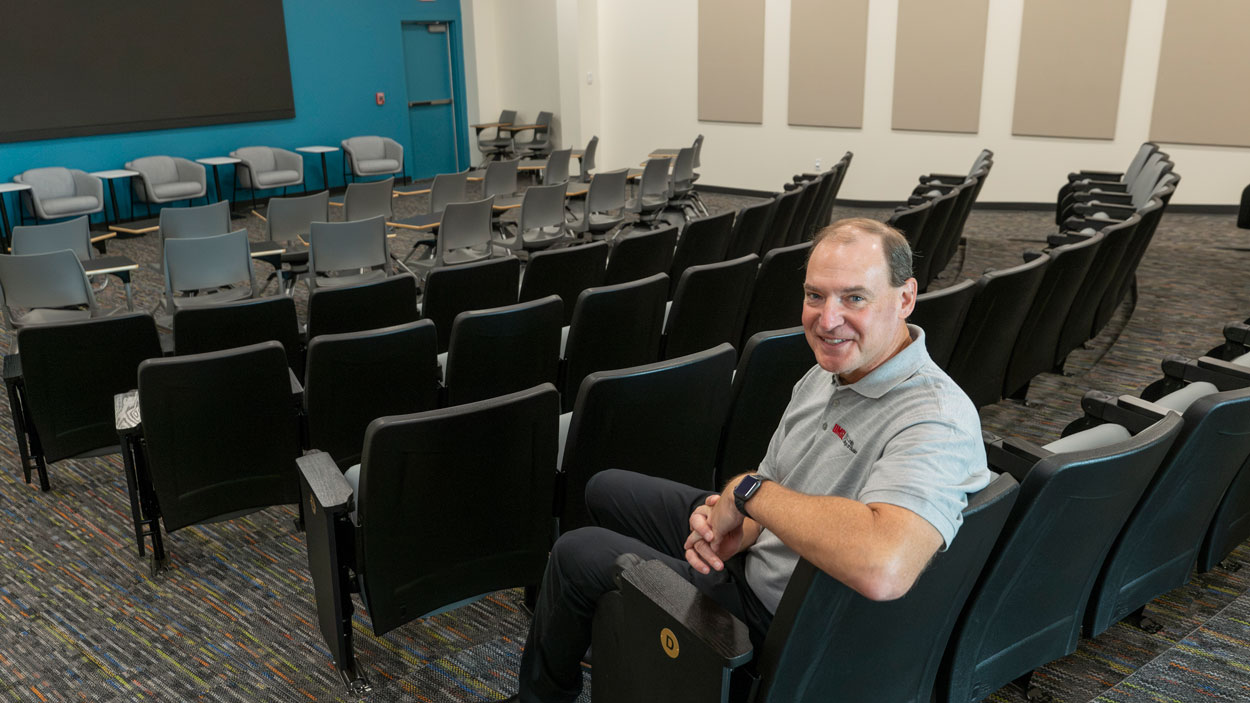
Scott Morris sits in the newly renovated auditorium at the UMSL Innovation Center, where the finals of the All-Campus Pitch Competition will be held in March. (Photo by Derik Holtmann)
Scott Morris, the director of the Entrepreneurship and Innovation Center at the University of Missouri–St. Louis, loves organizing student pitch competitions. He’s seen how the experience can be beneficial for participants in ways that go far beyond just coming up with an idea and creating a potential business plan.
“We’ve had students go up on stage and struggle, but they come off stage and they are so excited because they did it,” he said. “They conquered that public speaking fear. That’s what we’re giving these students. We want to continue to work with our students and help them with pitches and help them learn to talk to investors and build their business opportunities.”
Morris and his team saw these benefits and became determined to find a way to attract a wider array of students. He was very aware that a vast majority of past participants have come from the Ed G. Smith College of Business or the Pierre Laclede Honors College, but from talking with deans and faculty members in other colleges and schools at UMSL, Morris knew that bright ideas existed elsewhere. It was up to his team to find a way to shine a spotlight on those ideas.
That’s how UMSL’s first-ever All-Campus Pitch Competition was born. Morris and Brittany Davis-Gurkan, the community engagement and operations coordinator for the EIC, have been hard at work spreading the news. They have found a receptive audience, to say the least.
“I was excited by the idea,” said Xin Wang, one of the founding faculty members at the new School of Engineering. “This strikes me as a great opportunity for students to take their creative ideas beyond the classroom and see how they connect with real-world problems and audiences.”
Teams are forming now. The competition is set up as sort of a March Madness-style tournament. Each school/college will have its own semifinal competition in February and then the final 10 to 12 teams will meet for the ultimate competition in March.
“I think it’s a great opportunity for my students in the Human Service Organizations class,” said Baorong Guo, a professor in the School of Social Work. “Several of them have already expressed interest in creating their own organizations to serve their communities, so this competition seems like a good fit – it would give them a structured way to develop and pitch those ideas while receiving valuable feedback and potentially securing resources to move forward.”
That feedback and structure is a big part of the All-Campus Pitch Competition, too. Starting in November, the EIC is offering pitch workshops, where the participants will have access to instructional videos, Canvas templates, information such as judging criteria and in-person assistance.
As Morris and his team were contemplating the new all-campus approach, they realized another tweak was needed, too.
“It almost seemed like such a waste, because as we were recruiting for that second pitch competition in the spring, we had so many students who literally wouldn’t take a flyer,” he said. “They’d say, ‘No, I never want to own my own business.’”
Like any good entrepreneur, Morris digested the feedback and adjusted his strategy. For this edition of the competition, students can pitch more traditional business ideas, but they can also pitch solutions to any sort of problem they’ve identified.
The idea stemmed from a similar scenario Morris gave to one of his classes.
“One of their pitch ideas was that the professor should come to class dressed in a Halloween costume at least once a month to drive attendance up,” he said. “In this case, the problem was lagging attendance. The solution is, if the professor is going to dress up and embarrass themselves, and the students don’t know when it will happen, the students will show up and be engaged and excited just in anticipation of whatever goofy thing the professor is going to do. The result was the students would attend more classes, make better use of their tuition dollars and help them get better jobs.”
This all-campus competition is an example of people in one area of expertise in UMSL’s ecosystem reaching out to help students in other areas.
“My research interest in nonprofit financing and social enterprise always reminds me of how important it is for a successful social service organization to achieve both mission fulfillment and financial sustainability,” Guo said. “In social work, we equip students with the knowledge, skills and values needed for accomplishing the service mission. I think social work students can benefit from this opportunity by learning the business side of social impact; for example, how to develop sustainable revenue models, articulate their value proposition to potential funders and stakeholders and think strategically about resource allocation.”
Morris is hoping this pitch competition can create a sense of camaraderie for students across campus. Not only will the winning team receive a cash prize, but that team’s college or school will have a trophy to display the rest of the year. That incentive has been well received, too.
“Engineering students are natural problem-solvers, and many of their projects have real potential for innovation and entrepreneurship,” Wang said. “Participating in this competition gives them a platform to showcase their ideas, collaborate across disciplines and learn how to communicate the value of their work to a broader audience – skills that are incredibly important in today’s professional world.”














